How Arizona’s Attempt To Pass Voter ID Laws Ironically Failed At The Ballot Box
On Nov. 8, Arizona’s Proposition 309, which required more proof of identity to vote by mail and in person, fell short by 18,487 votes and was defeated by the small margin of 49.6 percent to 50.4 percent. The Republican legislature and governor successfully passed numerous voting-related laws but failed to pass a measure to increase voter ID requirements.
Instead, they put Proposition 309 on the ballot, a measure that was was opposed by the League of Women Voters, the Arizona Education Association (teachers union), and many Democrat candidates. Former President Obama even claimed “democracy as we know it” was on the ballot in Arizona.
Considering that polls, such as the Monmouth University poll of 2021, have consistently recorded strong bipartisan public support for voter ID laws at about 80 percent overall, why did this voter ID measure fail?
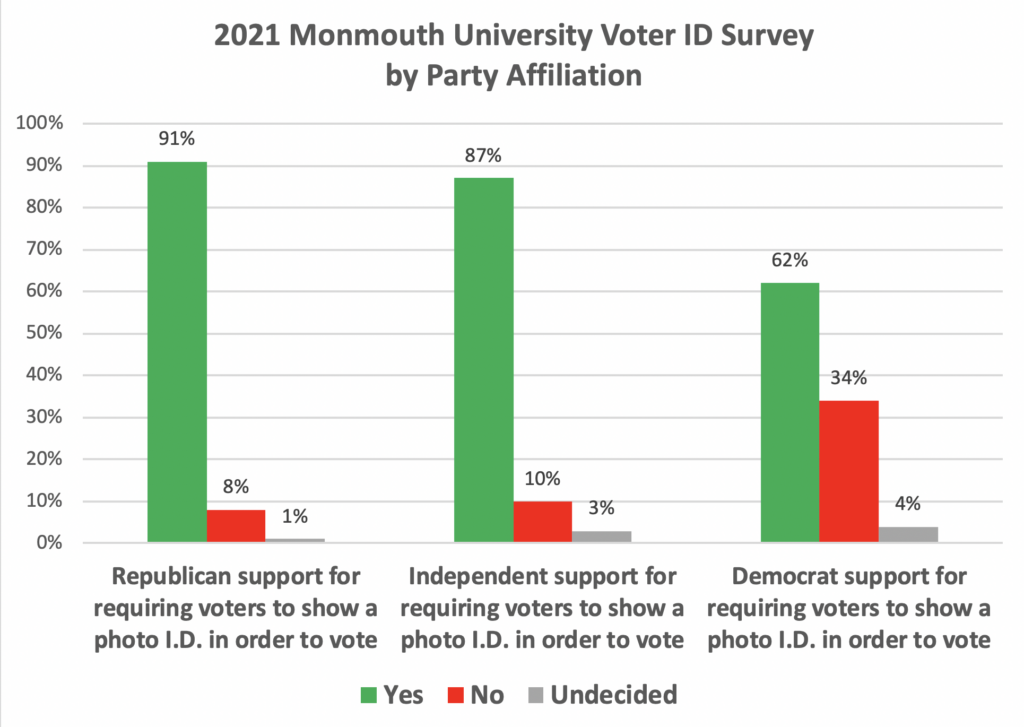
On the same Election Day, Nebraska passed its voter ID Initiative 432 by a large margin of 65.5 percent to 34.6 percent. A “yes” vote supported amending the state constitution to require valid photo identification in order to vote and authorized the state legislature to pass laws to specify the photo identification requirements. Granted, Nebraska has a higher proportion of registered Republicans, but Arizona has a higher proportion of independent voters from which to draw support.
Below is a comparison of how Arizona and Nebraska voted. While we can’t simply expect 91 percent of Republicans to always support voter ID laws, it is clear that the Arizona results fell far short.
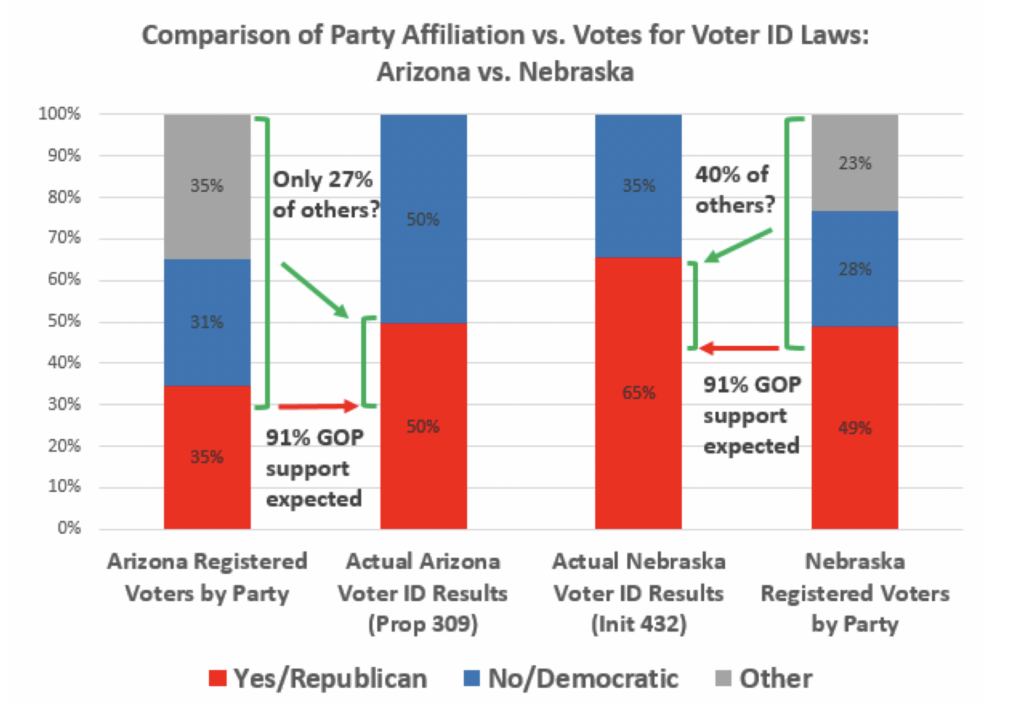
Before attempting to identify the cause of this failure, we must first note the differences between the two ballot proposals. Arizona already had voter ID requirements for in-person voters, but Nebraska had virtually none.
Under existing Nebraska law, the only time voters were asked for their ID (or a form of address verification) was after they first mailed in their registration application but failed to provide an ID or a form of address verification at that time. A “yes” vote on Nebraska Initiative 432 supported amending the state constitution to require valid photo identification in order to vote and authorized the state legislature to pass laws to specify the photo identification requirements.
Under Section 16-579 of Arizona state law, electors must present accepted forms of photo identification, or two alternate forms of documentation that contain an address, when voting in person. However, there are no ID requirements other than a signature when voting by mail. Members of federally recognized tribes are not required to have an address or photo on their tribal identification in order to cast a provisional ballot.
Arizona’s Proposition 309 would have required voters to write their birth date, government identification number, and signature on an early ballot affidavit to vote by mail, rather than just simply putting their signatures on early ballot envelopes. The measure would have changed in-person voting to require photo identification for all in-person voters and, if the address on the identification didn’t match voter rolls, then the two items such as utility bills would have been required. The Department of Transportation would have had to issue IDs for voting purposes for free.
In short, Nebraska was starting from virtually nothing, while Arizona already had some voter ID requirements, but not for mail-in voting. The Nebraska initiative was simple and did not differentiate between in-person and mail-in voting while the Arizona proposition defined specific mail-in and in-person voting ID requirements.
The following chart shows the expected results if voting had mirrored the polling results. After taking into account the party affiliation and demographics of Arizona voters, we would still have expected about 80 percent of Arizona voters to approve a good voter ID law. So what went wrong?
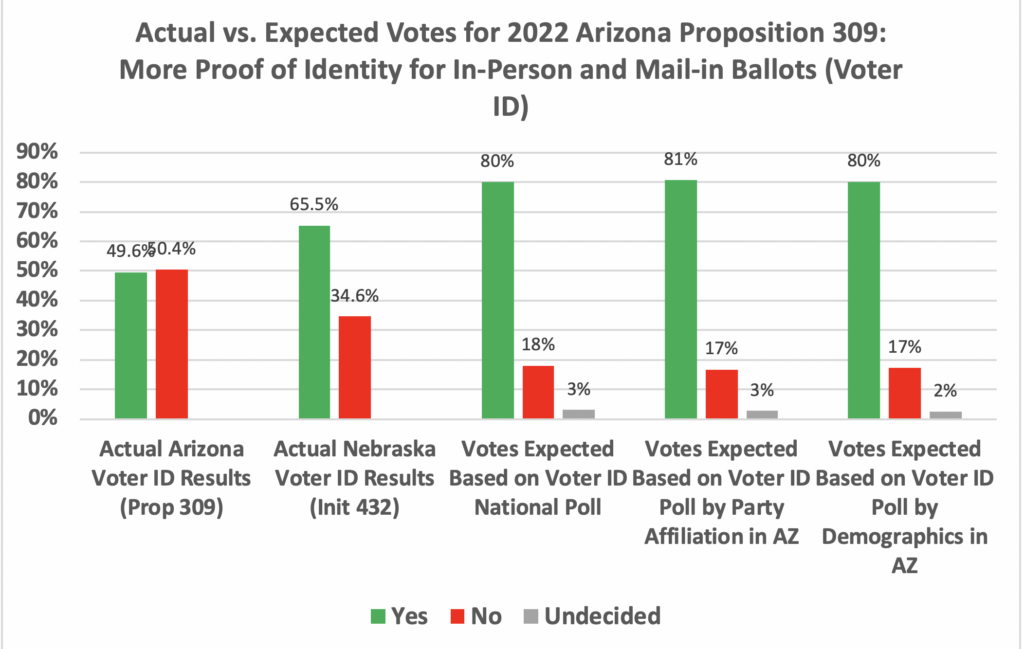
Another factor to consider is that voters also have a general preference to have voting made easier rather than harder. But the Monmouth University poll shown below clearly shows that voters are more interested in having voter ID laws than making voting easier (in general), and are least likely to support easier mail-in voting.
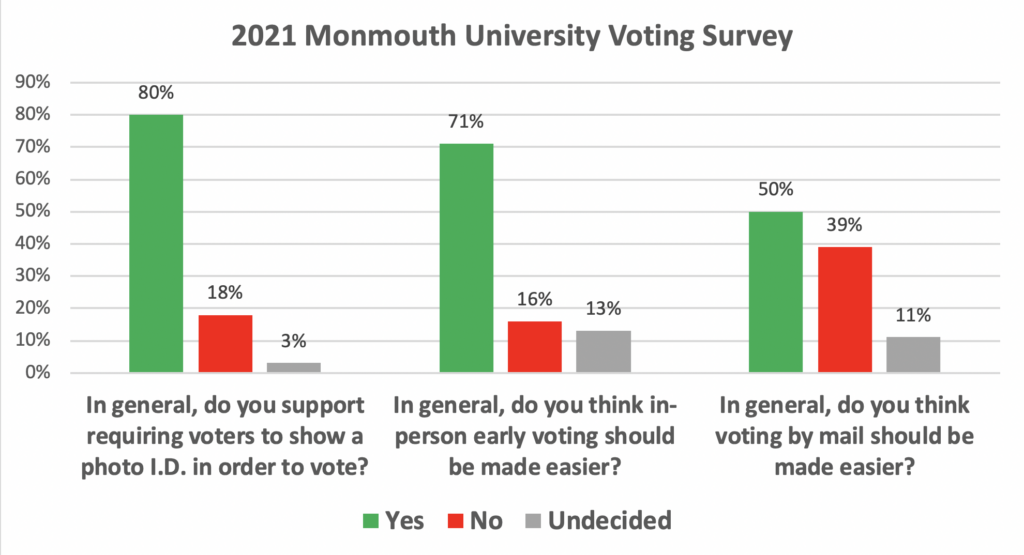
Does the prospect of presenting a photo ID in person or writing down an ID number on a mail-in ballot affidavit really make voting too hard in the opinion of voters who prefer to have a voter ID law? According to a Pew Research poll from October 2022, most voters believe that their state voting rules make it neither “too easy” nor “too hard” to vote. Only a minority of Republican voters, and even fewer Democrat voters, believe it is too easy to register and vote, especially where Republicans control the state government.
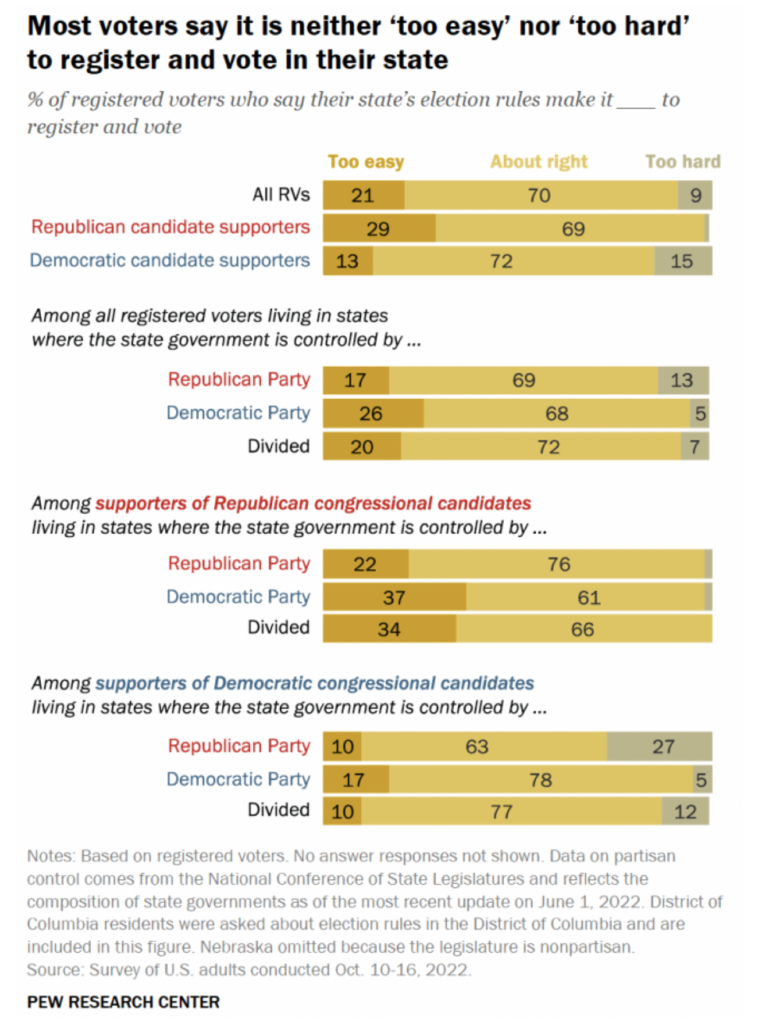
While no exit polls directly asked voters whether they supported the voter ID proposition, Edison Research conducted exit polls for ABC News with a couple of questions asking about voter confidence in fair elections that provide some insight.
Almost all of those who voted for Democrats said they had confidence in the 2022 elections and believed Joe Biden legitimately won the 2020 election. Almost half of those who voted for Republicans had low confidence that the 2022 election would be conducted fairly, while the vast majority believed Joe Biden did not win legitimately in 2020.
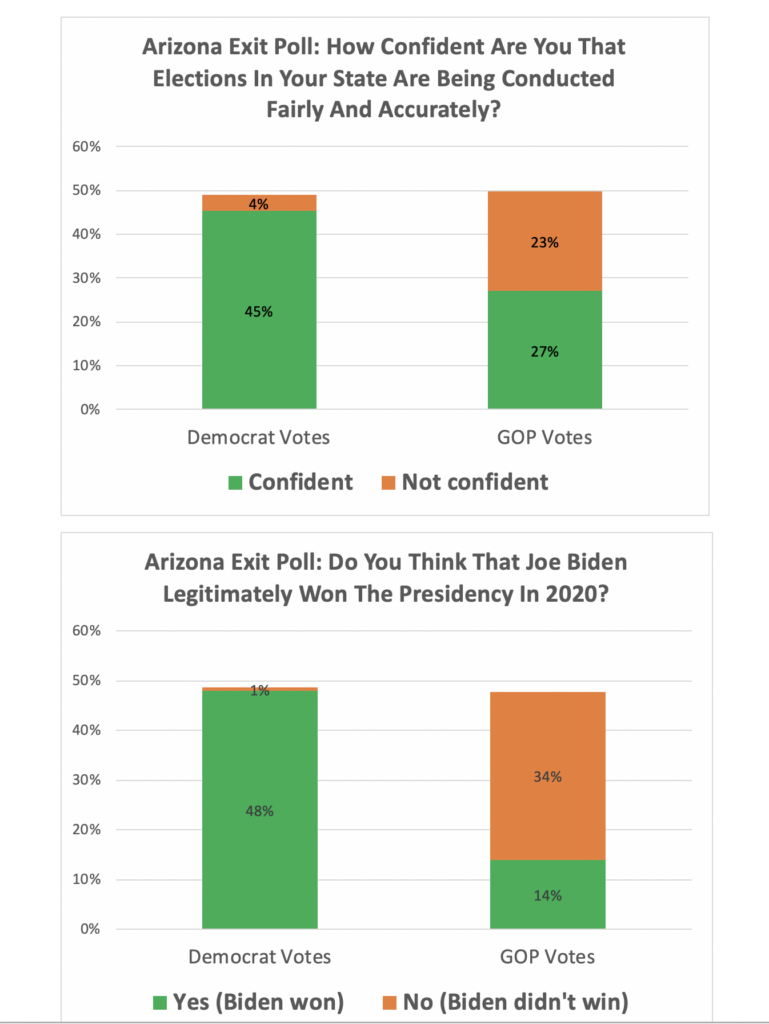
The results above imply that Arizonans who voted for Republicans believed the 2022 midterm election would be more fairly conducted than the 2020 election, while those who voted for Democrats were slightly less confident. However, a Pew Research poll in October 2022 showed a continued national decline in the trust of Republican voters in election administration, especially with mail-in ballots, and an increase in trust for Democrat voters, as shown below.
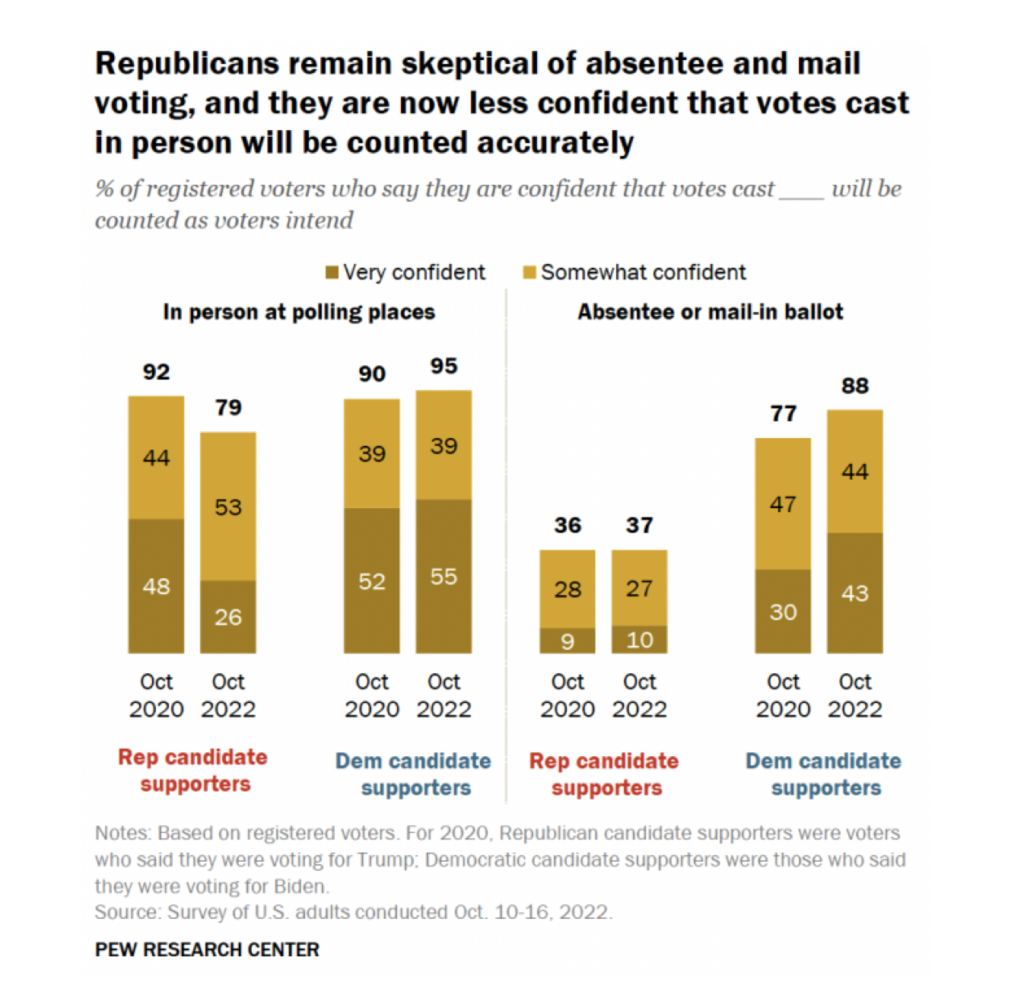
Did something change the minds of Arizona Republicans to inspire more confidence in the 2022 elections? Maybe it was the knowledge that Maricopa County was able to hold a fairly thorough 2020 election audit, despite the lack of cooperation of the Maricopa County supervisors and the exposure of many major issues. Or maybe it was complacency due to the passage of other new election laws. Or perhaps it was merely bias that voters typically have in favor of trusting their own local government. This theory is supported by the Pew poll, which showed that people have more trust in their own state election laws even if they have less faith in elections overall.
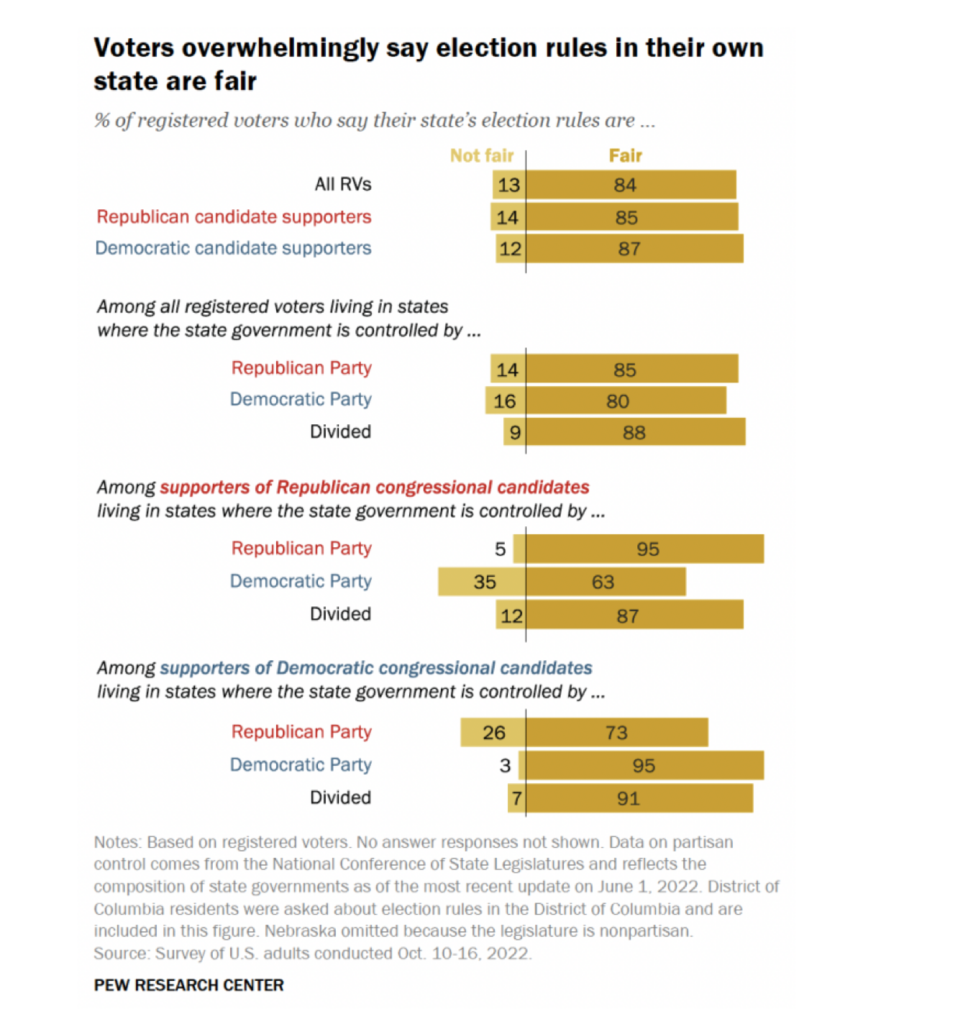
Another exit poll, conducted by BigDataPoll and discussed in Exhibit 11 of Kurt Olsen’s declaration in Kari Lake’s election lawsuit, identified a more quantifiable possible cause of the 18,487 vote shortfall for Proposition 309. As identified in the lawsuit, there were extensive printer and tabulator issues at 59 percent of Maricopa County vote centers that disproportionately disenfranchised tens of thousands of Republican voters who were unable to cast a vote. The Maricopa County recorder shows registered Republicans made up 52.7 percent of total votes cast on Election Day, followed by 30.7 percent of Independent voters and only 16.6 percent of registered Democrats.
Furthermore, Election Day voters included a large proportion of Democrats who crossed over to vote for Republicans. BigDataPoll indicated that 16.7 percent of registered Maricopa County Democrats who voted on Election Day voted for Lake. That compares to only 0.6 percent of Democrats who voted early by mail-in ballot. Similarly, 13.6 percent registered Maricopa County Republicans who voted early by mail-in ballot crossed over to vote for Democrat Katie Hobbs, but only 1.2 percent of registered Republicans who cast ballots on Election Day. Even 65.3 percent of Independent voters who voted on Election Day backed Lake, compared to 63.4 percent of early mail-in voters who backed Hobbs.
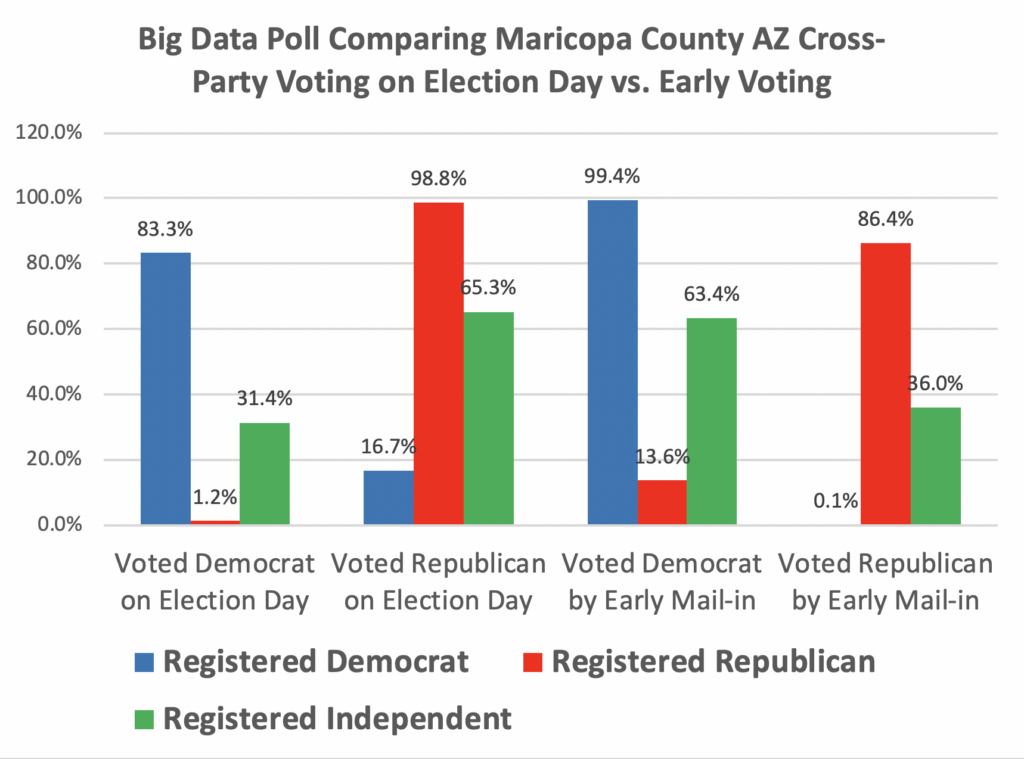
This exit poll clearly shows that Democrats and Independents who voted for Republicans tended to vote in person on Election Day while Republicans and Independents who voted for Democrats tended to vote via early mail-in ballot. The implication here is that Election Day voters are far more likely to vote for Republicans and are probably less willing to trust mail-in ballots.
Analysis of data that suggested Republicans were disenfranchised on Election Day due to voting machine failures and concluded, with a reasonable degree of mathematical certainty, that Kari Lake would have yielded a net gain of enough votes to call the results into question. This might also apply to Proposition 309. Similarly, allegations of improper signature verification of tens of thousands of mail-in ballots would suggest that too many illegal ballots favoring Democrats, who were more likely to vote against voter ID, were counted in violation of law.
While we can’t say we have a definitive answer as to why Proposition 309 failed, the most likely possibilities are as follows:
- Republicans failed to keep the ballot proposition simple and thereby confused voters.
- Democrats scared voters into believing it could disenfranchise them.
- Voters thought the extra measures would unnecessarily make voting harder.
- Republican voters were disproportionately disenfranchised due to Election Day voting machine failures.
- Democrats benefited from improper signature verification of mail-in ballots.
Until voter ID laws change in Arizona, mail-in voting will continue to be verified only by signature matching, which the 2020 audit, and Kari Lake’s lawsuit, showed to be fraught with problems, including inadequate verification measures, a lack of transparency and oversight, and registration database integrity issues. If Kari Lake’s lawsuit is successful, who will have “standing” to file a similar lawsuit to challenge the results of the Proposition 309 vote?
There is no substitute for in-person, Election Day voting, with limited numbers of mail-in ballots, and hand-counted paper ballots with public oversight. It would be quite ironic if we someday discover that the failure of this ballot measure, as well as other Republican losses, was a direct result of the failure of Republican legislators to first secure the election with a stronger voter ID law.
David Thalheimer is a graduate of George Washington University, Harvard University, the Air War College, and the National Intelligence University. He retired from the U.S. Air Force as a colonel and now works as an engineer in the field of cybersecurity.





Comments are closed.